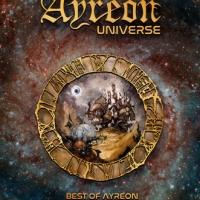Founded in 1988 by guitarist Karl Groom, English quintet Threshold is one of today’s most iconic progressive metal acts. With nearly a dozen studio LPs under their belt, it’s not hard to hear why, as they’ve always delighted fans when it came to top-notch vocals, musicianship, and songwriting. In that respect, their eleventh studio outing, Legends of the Shires, very much maintains those qualities—or two-thirds of them, at least. Despite some truly stellar performances throughout record, the overall experience is made laborious by a lengthy runtime (eighty-three minutes) packed with generic songwriting, cliché lyricism, and a lack of sundry arrangements. It’s fine in small doses—and there are some standout bits, for sure—but for the most part, it’s a tad too stale and common to stand out.
The most distinctive aspect of the album is that it marks the departures of longtime singer Damian Wilson and fledgling guitarist Pete Morten, as well as the return of Glynn Morgan after twenty-three years (since 1994’s Psychedelicatessen). Once again, the line-up is completed by keyboardist Richard West, bassist Steve Anderson, and drummer Johanne James (all of whom also provide backing vocals). As a result of these changes—as well as its exemplification of the band “flexing creative muscles and reveling in exploratory flair”—Threshold sees Legends of the Shires as “the start of a new era in [our] illustrious story.” Speaking of plot, the double disc journey concerns “a nation trying to find its place in the world. It could also be about a person trying to do much the same thing.” West adds that he prefers to leave it at that, as giving too much more away may make it “one-dimensional. . . . you want to provide space for people to put themselves in the story.”
There’s definitely an overarching sense of deep emotion and purpose to the sequence, and a large part of that comes from the lovely three-part “Shire” suite. The opening entry is essentially an acoustic guitar ballad with birdsong in the background; in a way, it recalls the warm guitarwork of Gabriel-era Genesis, and Morgan’s impassioned gruffness is quite fetching and fitting. Halfway through the full-length, the second part provides a heavier and more complex reiteration, while the concluding section is a brief and dreamy coda decorated with beautiful piano motifs and ethereal vocals. Together, this trilogy keeps Legends of the Shires’ focus and continuity in place, as well as adds a lot of pathos to the whole venture.
While there are certainly other standout moments throughout the collection, for sure—such as the nuanced melodies, harmonies, and instrumental changes throughout “The Man Who Saw Through Time,” the Ayreon-esque symphonic madness of “Trust the Process,” and the general richness of closer “Swallowed”—the vast majority of the record is repetitious musically and generic/corny melodically and lyrically. (Imagine Dream Theater covering the cheesiest songs by Journey, Boston, Foghat, etc.) The pieces are catchy and intense, no doubt—especially “Small Dark Lines,” “Stars and Satellites,” and “Lost in Translation”—but so much of it is too superficial and familiar. In other words, there’s very little here that sets Threshold apart from many other genre contemporaries, be they mainstay peers or newcomers, and it all gets tiresome and predictable before too long.
Legends of the Shires is by no means a bad album; on the contrary, it packs as much playing and singing prowess as you’d want from an iconic progressive metal band. However, that may be precisely the problem as well, as it feels like the quintet is relying on established troupes and safe ideas too much (and reaching for innovation and uniqueness far too infrequently). On a superficial and/or technical level, there’s plenty to enjoy here, but a deeper examination reveals almost nothing that fans of the band and/or style haven’t heard before. If that works for you, awesome, but if not, you’ll find Threshold hitting its creative limits very often once you dive in.





